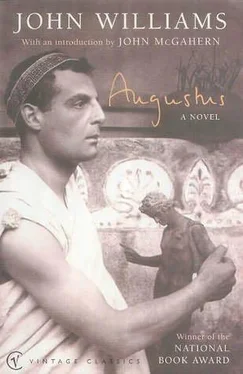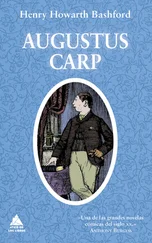John Williams - Augustus
Здесь есть возможность читать онлайн «John Williams - Augustus» весь текст электронной книги совершенно бесплатно (целиком полную версию без сокращений). В некоторых случаях можно слушать аудио, скачать через торрент в формате fb2 и присутствует краткое содержание. Жанр: Историческая проза, на английском языке. Описание произведения, (предисловие) а так же отзывы посетителей доступны на портале библиотеки ЛибКат.
- Название:Augustus
- Автор:
- Жанр:
- Год:неизвестен
- ISBN:нет данных
- Рейтинг книги:3 / 5. Голосов: 1
-
Избранное:Добавить в избранное
- Отзывы:
-
Ваша оценка:
- 60
- 1
- 2
- 3
- 4
- 5
Augustus: краткое содержание, описание и аннотация
Предлагаем к чтению аннотацию, описание, краткое содержание или предисловие (зависит от того, что написал сам автор книги «Augustus»). Если вы не нашли необходимую информацию о книге — напишите в комментариях, мы постараемся отыскать её.
Augustus — читать онлайн бесплатно полную книгу (весь текст) целиком
Ниже представлен текст книги, разбитый по страницам. Система сохранения места последней прочитанной страницы, позволяет с удобством читать онлайн бесплатно книгу «Augustus», без необходимости каждый раз заново искать на чём Вы остановились. Поставьте закладку, и сможете в любой момент перейти на страницу, на которой закончили чтение.
Интервал:
Закладка:
In the second year of my marriage to Marcus Agrippa, he opened in Rome, for the comfort of the people, what was said to be the most opulent bathhouse in the history of our city. Before that, I had not often attended the public baths; I believe that when I was young, Livia, fancying herself the model of the ancient virtues, disapproved of the luxuries offered at such places; and I must have caught the infection of her virtue. But my husband had read in a work by a Greek physician that bathing ought not to be looked upon merely as a luxury, that it might indeed contribute toward the prevention of mysterious illnesses that periodically swept through any crowded city; he wished to encourage as many of the common people as he might to avail themselves of such hygienic measures, and he persuaded me to occasionally forsake the privacy of my own bath and go among the people, so that all would see that it was fashionable to frequent the public baths. I went as if it were a duty; but I had to admit to myself that it became a joy.
I had never known the people before. I had seen them in the city, of course; they had waited on me in the shops; I had spoken to them, and they had spoken to me. But they had known always who I was: I was the Emperor's daughter. And I had known (or thought I had known) that their lives were so distant from my life that they might as well belong to another species. But naked in the bath, surrounded by hundreds of women who shout and scream and laugh, an Emperor's daughter is indistinguishable from the sausagemaker's wife. And an Emperor's daughter, vain though she might be, discovered an odd pleasure in such an indistinguishability. So I became a connoisseur of baths, and remained one for the rest of my life; and after the death of Marcus Agrippa, I discovered baths in Rome whose existence I had never dreamed of, which offered pleasures that it seemed I had known once, but in a dream…
And now, still, I bathe nearly every day, as I imagine the soldier does, or the peasant, after his work is done, if there is a stream nearby. My bathhouse is the sea, and the marble of the pool is the black volcanic sand that gleams in the afternoon sun. There is a guard who attends me-I suspect that he has been ordered to prevent me from drowning myself-and stands impassively away from me, watching me incuriously as I let my body into the water. He is a castrate. His presence does not disturb me.
On quiet afternoons, when the sea is calm, the water is like a mirror; and I can see my face reflected there. It amazes me that my hair is nearly white now, and that my face is becoming lined. I was always vain about my hair, which began to go gray when I was very young. I remember that my father came upon me once when one of my maidservants was plucking out these gray hairs, and he asked me: "Do you look forward to becoming bald?" I replied that I did not. "Then," he said, "why do you allow your servant to hasten that condition?"
… The hair is nearly white, the face is lined-and as I lie in this shallow water, the body that I see seems to have nothing to do with that face. The flesh is as firm as it was twenty years ago, the stomach flat, the breasts full. In the chill water, the nipples harden, as once they did beneath the caress of a man; and in the buoyancy of the water, the body undulates, as once it did when it took its pleasure. It has served me well, this body, over the years-though it began its service later than it might have done. It began its service late, for it was told that it had no rights, and must by the nature of things be subservient to dictates other than its own. When I learned that the body had its rights, I had been twice married, and was the mother of three children…
And yet that first knowledge was like a dream, and for many years I did not believe it. It was at Ilium, and I was worshiped as a goddess. Even now, it is like a dream; but I remember that at first I thought it all an amusing foolishness, a barbaric and charming foolishness.
I came to see that it was not… That youth I chose that day in the sacred grove could not have been more than nineteen; he was virginal; and he was the most beautiful boy I have ever seen. I can close my eyes, and see his face, and almost feel the firm softness of his body. I believe that when I took him into the cave, I did not intend to fulfill the ritual. I did not have to; I was the Mother Goddess, and my power was absolute. But I did fulfill the ritual, and discovered the power of my body and the power of its needs. It was a power that I had been led to believe did not exist… He was a sweet boy. I wonder what became of him, after he had entered the goddess and lain with her.
I believe that I must have lived in a kind of dream until the death of Marcus Agrippa. I could not believe what I had discovered, and yet its presence was with me always. I was faithful to Marcus Agrippa-I could not feel that the goddess who took her lover then at Ilium was wife to Agrippa; I was not faithful to Tiberius Claudius Nero.
It was after the death of that good man, Marcus Agrippa, that Julia, daughter of Octavius Caesar, the August, discovered the power that had been hidden within her, and discovered the pleasure that she could take. And the pleasure she could take became her power, and it seemed to her that it was a power beyond that of her name and of her father. She became herself.
Yes, it has served me well, this body that is blurred by the water, that I can see as I lie supine in my pelagic bath. It has served me, while seeming to serve others. It has always served me. The hands that roamed upon these thighs roamed there for me, and the lover to whom I gave pleasure was a victim of my own desire.
Sometimes, bathing, I think of those who have given this body pleasure-Sempronius Gracchus, Demosthenes, Appius Pulcher, Cornelius Scipio-I cannot remember their names now, many of them. I think of them, and their faces and their bodies merge together, so that they are as one face and one body. It has been six years since I have known the touch of a man, six years since beneath my hand or my lips I have caressed the flesh of a man. I am forty-four years old; four years ago I entered my old age. And yet still at the thought ofthat flesh, I can feel my heartbeat quicken; I can almost feel myself to be alive, though I know that I am not.
For a while, I was the goddess to the mystery of all my pleasure; and then I became a priestess, and my lovers were the adepts. I served us well, I think.
And I think at last of the one from whom I had ultimate pleasure, one for whom all the others had been prelude, so that I might be prepared. I knew the taste and heft of his flesh more intimately than I have known anything else. I cannot believe that six years have gone. I think of Julius. The tide rises gently, and the water moves over my body. If I do not move, I may think of him. I think of Julius Antonius.
III Letter: Gnaeus Calpurnius Piso to Tiberius Claudius Nero, in Rhodes (3 B.C.)
I must say at the outset, my friend, that I am filled with apprehension; and I do not know whether it is justified or not. Let me give you a few causes, so that you may judge the soundness of my feeling.
Your wife, so far as I can determine, has been faithful to one man for more than a year. That man is, as you know, Julius Antonius. She is seen constantly in his company; indeed, the liaison has become so widely recognized that no longer does either of them try to dissemble it. Julia receives guests in his home, and directs the activities of his servants. Her father must know of the affair by now, and yet he remains on friendly terms with his daughter, and with Julius Antonius. Indeed, it is rumored that Julia intends to divorce you, and to take Julius as her husband. In this rumor, however, I think we can put very little credence. Octavius Caesar would never allow it. Such an official alliance would simply destroy the delicate balance of power that he maintains, and he knows it. I mention the rumor only to indicate to you the extent to which the affair has grown.
Читать дальшеИнтервал:
Закладка:
Похожие книги на «Augustus»
Представляем Вашему вниманию похожие книги на «Augustus» списком для выбора. Мы отобрали схожую по названию и смыслу литературу в надежде предоставить читателям больше вариантов отыскать новые, интересные, ещё непрочитанные произведения.
Обсуждение, отзывы о книге «Augustus» и просто собственные мнения читателей. Оставьте ваши комментарии, напишите, что Вы думаете о произведении, его смысле или главных героях. Укажите что конкретно понравилось, а что нет, и почему Вы так считаете.











